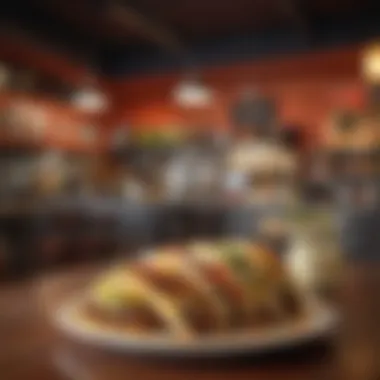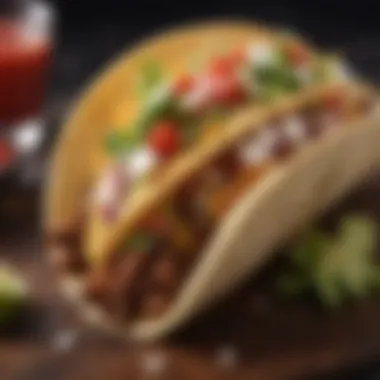The Best Tacos in Denver: A Culinary Journey


Intro
The taco has long transcended its humble origins, evolving into a culinary item celebrated for its versatility and regional variations. In Denver, this evolution is vividly apparent. The taco scene in this city reflects a rich tapestry of cultural influences and innovative interpretations, making it a focal point of interest for both locals and visitors alike. The establishments that make this food scene noteworthy showcase not only craft but also an embracing of diverse ingredients and flavors, creating dishes that appeal to a wide range of palates.
As we commence this exploration, it is essential to understand what shapes Denver's taco culture. From traditional Mexican recipes to modern twists incorporating local produce, the city's tacos represent the intersection of various culinary traditions. This guide aims to illuminate the standout taco spots that define this vibrant food scene and explore what contributes to their unique identities.
"A taco is not just food; it's a cultural artifact, reflecting the history and tastes of the people behind its creation."
In the following sections, we will examine the distinct local ingredients used, the different styles of tacos offered, and the overarching influence of Denver's culinary landscape on this beloved food. Additionally, readers will find practical tips for navigating the local taco scene, ensuring that they have a fulfilling experience while exploring the best that Denver has to offer in its taco offerings.
An Overview of Denver's Taco Culture
Denver’s taco culture is a rich tapestry, reflecting the diverse influences that exemplify the city’s identity. As a hub of culinary exploration, Denver offers a vibrant array of taco options that cater to a variety of palates. This section aims to provide essential context, delving into historical roots and contemporary influences that shape local taco offerings.
Historical Context
The origins of taco culture in Denver can be traced back to the influx of Mexican immigrants in the early 20th century. They brought with them traditional cooking methods and recipes that laid the groundwork for what would become a dynamic taco scene. Restaurants like Casa Bonita, which opened in 1974, exemplify early attempts to integrate Mexican cuisine into the local dining landscape.
Over the decades, Denver's taco offerings evolved, influenced by various immigrant groups, particularly from Central and South America. This mixture of cultures led to a unique blending of flavors, contributing to the development of both authentic and modern interpretations of tacos.
Influences on Local Taco Styles
Several key factors play a role in defining local taco styles in Denver. These include:
- Cultural Sensitivity: As the city continues to grow, many chefs seek to honor traditional recipes while also innovating. This balance contributes to a richer culinary experience.
- Ingredients Sourcing: Local markets and farms have increasingly provided fresh and organic ingredients. Chefs use these local resources to create distinctive flavors that resonate with Denver’s health-conscious community.
- Culinary Trends: The impact of the farm-to-table movement is evident. Many establishments prioritize sustainable practices and seasonal ingredients. The ever-changing food trends influence menu items in taco shops across the city.
Defining Characteristics of Great Tacos
To truly appreciate the taco landscape in Denver, one must understand what defines a great taco. The characteristics of a taco go beyond mere assembly of ingredients. Every element contributes to the overall experience, creating complex layers of flavor and texture. This section explores key factors that elevate a taco from ordinary to remarkable, addressing the significance of quality ingredients, the tortilla type, and the differences between traditional and contemporary preparation techniques.
Ingredients That Matter
The core ingredients of a taco are paramount in defining its quality. Freshness and authenticity influence every bite. Classic tacos often feature well-seasoned meats such as carne asada or al pastor, which are marinated to enhance their flavors.
For example, the use of Grass-fed beef enhances both flavor and texture, while the choice of toppings such as cilantro, onions, and lime juice adds brightness.
Furthermore, sourcing local and seasonal produce can heighten the taste experience. Specific items like heirloom tomatoes in a salsa or hand-made queso fresco on top can transform a simple dish into something memorable.
"Ingredients are not just components; they are storytellers of cultural heritage and culinary tradition."
Tortilla Types: Corn vs. Flour
Tortillas serve as the foundation of any taco. The choice between corn and flour tortillas can greatly impact the eating experience. Corn tortillas are traditional, offering a robust flavor and texture that complements the fillings well. They are typically made from masa harina, which is nixtamalized corn. This process not only yields a superior flavor but also provides a nutritional boost in the form of vitamins.
Flour tortillas, on the other hand, feature a different palate. They are softer, often larger, and can hold more ingredients. Their flexibility makes them a popular choice for many taco styles, especially for those that may require a heftier filling.
Ultimately, the decision often hinges on personal preference or the specific taco style being approached. Both types have their strengths and can be used effectively to create a superb taco.


Traditional vs. Modern Techniques
The techniques employed in preparing tacos can also distinguish the memorable from the mundane. Traditional methods often emphasize simplicity and time-honored practices, such as cooking meat on an open flame or slow-roasting it until it's tender. These procedures can enhance the depth of flavor.
However, modern techniques also bring innovation into the taco scene. Chefs might employ sous-vide methods for precise temperature control or use unique fusion flavors that blend diverse culinary practices. For instance, mixing Korean BBQ with traditional Mexican fillings creates an entirely new tasting experience.
While tradition offers authenticity, modern methods push boundaries and present new possibilities. Finding a balance between them can define the cultural richness of taco offerings across Denver.
Top Taco Establishments in Denver
The taco scene in Denver is diverse and rich, showcasing various establishments that reflect the city’s culinary evolution. This section delves into some top taco places, each offering unique flavors, techniques, and atmospheres. By understanding these establishments, readers gain insights into what sets them apart in a crowded culinary landscape.
Restaurant Profiles
Authentic Family-Owned Taquerias
Authentic family-owned taquerias are significant pillars in Denver's taco culture. These establishments often serve recipes passed down through generations. They emphasize traditional cooking techniques and use fresh ingredients sourced locally. This commitment to authenticity is a key aspect of their appeal.
Many taco lovers find comfort in these familiar flavors, which resonate with cultural heritage.
One standout feature of these taquerias is their homely atmosphere. Many patrons feel a sense of community when dining here. Additionally, these family-run businesses often prioritize customer satisfaction, leading to dedicated followings. However, they may have limited hours and menu options compared to larger chains. Still, their charm makes them a popular choice among locals and tourists alike.
Contemporary Fusion Spots
Contemporary fusion taco spots blend traditional Mexican flavors with global culinary trends. These establishments attract a younger demographic seeking innovative dining experiences. The key characteristic of fusion tacos is creativity. Chefs often experiment with various ingredients, resulting in unique flavor combinations.
A unique feature of these spots is their rotating menu, which keeps things exciting for diners. They may feature seasonal ingredients or collaborations with local breweries. However, their focus on experimentation can lead to inconsistent quality. Still, for adventurous eaters, these venues offer an exciting take on classic taco dishes.
Food Trucks and Street Vendors
Food trucks and street vendors are essential parts of Denver's taco landscape. They provide quick, affordable options for those craving tacos on the go. The key aspect of these mobile establishments is accessibility. Food trucks can often be found at events and busy districts, making them convenient for a quick meal.
Their unique feature lies in their ability to adapt menus quickly, responding to customer feedback and preferences. This flexibility allows them to innovate and test new recipes frequently. However, they can face challenges such as limited seating and unpredictable operating hours. Despite these drawbacks, their vibrant flavors and immediate availability make them a favorite among taco enthusiasts.
Signature Dishes to Try
Regional Varieties
Regional varieties of tacos reflect the rich cultural landscape of Mexico and its influence in Denver. Each region has distinct ingredients and preparation methods. These variations add depth to the city's taco offerings, catering to diverse palates. The most notable regional style in Denver is the soft taco from northern Mexico, often filled with grilled meats and crisp toppings.
A key characteristic of these regional varieties is their celebration of local ingredients. Many establishments will customize their offerings based on seasonal produce. One unique aspect of this approach is its ability to introduce diners to authentic regional flavors they might not discover elsewhere. The only drawback might be that certain styles may not be available year-round.
Unique Ingredients and Pairings
The use of unique ingredients and pairings sets certain taco dishes apart in Denver. In today's culinary climate, diversity is key. Some tacos incorporate unusual proteins, such as octopus or vegan options like jackfruit. This trend reflects a growing interest in sustainability and adventurous eating.
The defining characteristic of these dishes is their innovative nature. Chefs often create signature sauces or salsas that enhance the overall flavor. A distinctive feature is the use of fresh herbs and spices, elevating traditional recipes. While these unique offerings can attract foodies, some traditionalists might prefer classic interpretations. Regardless, the creativity involved in these tacos makes them worth a try.
Exploring Popular Taco Styles


In the vibrant tapestry of Denver's culinary landscape, tacos represent a microcosm of cultural diversity and innovation. This section dives into popular taco styles, illuminating their unique characteristics and broad appeal. Taco styles not only showcase regional influences but also reflect personal preferences in flavor and presentation. Understanding these distinctions can enhance appreciation for what makes each taco experience singular.
Street Tacos
Street tacos are synonymous with authenticity and simplicity. These tacos often feature soft corn tortillas filled with a variety of meats such as carnitas, carne asada, or lengua.
The appeal lies in their easy accessibility and the vibrant street food culture surrounding them. Found at food trucks or vendors on busy corners, they are a quick, satisfying option. Street tacos typically come garnished with fresh cilantro, onions, and a spritz of lime, which elevate the flavors without overwhelming. As you savor these tacos, look for local favorites like La Calle or Los Chingones, both pivotal in providing this down-to-earth style of eating.
Gourmet Tacos
In contrast to street tacos, gourmet tacos present a more refined interpretation. These tacos often incorporate high-quality ingredients and creative flavor combinations. Many upscale restaurants in Denver provide a gourmet take, enhancing classic favorites with unique sauces or unexpected fillings.
You might find options like smoked duck with apricot salsa, or shrimp tacos drizzled with a spicy aioli. Gourmet tacos allow chefs to experiment, showcasing techniques that appeal to the adventurous palate. Establishments such as Tacos Tequila Whiskey are leading this charge, crafting visually stunning and delectable offerings that challenge traditional taco perceptions.
Tacos al Pastor
Tacos al pastor are a celebration of flavors that tell the story of cultural amalgamation. Originating from the Lebanese shawarma, these tacos feature pork marinated in a blend of spices, grilled on a vertical spit, and served in warm tortillas. The addition of pineapple gives a sweet contrast to the savory meat, balancing the palate remarkably.
This style thrives in Denver’s taco scene, primarily served with chopped onions and fresh cilantro. You would be remiss to overlook establishments like El Taco de Mexico, known for their mouthwatering version of this classic dish. The fusion of flavors in tacos al pastor exemplifies the beauty of culinary evolution.
Vegetarian and Vegan Options
With an increasing focus on healthy eating and sustainable practices, vegetarian and vegan tacos have gained significant popularity. They are no longer an afterthought on the menu; instead, they reflect creativity and depth.
Ingredients such as grilled zucchini, jackfruit, and tempeh are being cleverly used to create texture and flavor profiles that satisfy both vegetarians and meat lovers alike. Vendors like Native Foods provide diverse options ranging from spicy lentil tacos to hearty mushroom tacos topped with fresh slaw.
This growing trend proves that tacos can be inclusive, allowing various dietary preferences to indulge in flavorful experiences deserving of respect.
Embracing diverse taco styles in Denver allows for a culinary journey that captures the essence of cultural influences while celebrating innovation.
By exploring these various taco styles, one gains insights into not only the dishes themselves but also the community and stories behind them. Whether chasing authenticity in street tacos or seeking adventurous flavors in gourmet options, each style contributes to a rich taco heritage in Denver.
Understanding Taco Pairings
Understanding taco pairings is fundamental to enhancing the overall taco experience. While the taco itself often garners the most attention, the elements that accompany it can elevate the flavors and textures. Knowing how to pair tacos with the right salsas, side dishes, and beverages enriches the dining encounter. Each choice impacts how flavors interact, creating a more diverse and satisfying meal.
Salsas: A Critical Component
Salsa is more than just a condiment; it is a vital component of the taco experience. Different types of salsas bring unique flavors and levels of heat, and they can dramatically transform a simple taco into a culinary delight.
Some popular salsa types include Pico de Gallo, a fresh mix of chopped tomatoes, onions, cilantro, and lime juice, which adds brightness and acidity. On the other hand, a roasted salsa or salsa verde offers a richer, smoky flavor profile. Salsas are an extension of the taco's central ingredients and can enhance freshness or provide a complex flavor contrast. By experimenting with various salsas, one can discover which complements their chosen taco best, elevating the entire meal.
Accompaniments: From Rice to Beans
Accompaniments play a significant role in rounding out a taco meal. Traditional choices such as Mexican rice and refried beans not only supply additional nutrition but also bring balancing elements to the mix.
Rice can provide a light texture that offsets the main taco filling, while beans add protein and flavor depth. They help create a fuller plate that satisfies hunger without overwhelming the palate. Furthermore, these accompaniments may have their own seasoning or preparation style, offering more taste varieties for the diner to explore. Ultimately, pairing tacos with the right sides can enhance the overall meal satisfaction.


Beverages to Complement Tacos
Beverages are crucial in the dining experience, especially when it comes to tacos. Selecting the appropriate drink can elevate flavors and enhance the meal.
Traditional Drinks
Traditional Mexican drinks like Horchata or Agua Fresca are popular choices that complement tacos. Horchata, a creamy rice-based drink, offers sweetness and cooling properties. Its unique flavor also acts as a palate cleanser between bites. Agua Fresca, made from fresh fruit and water, provides a light and refreshing option. These drinks contribute positive qualities to the taco experience, making them beneficial choices for those exploring the taco scene.
Craft Beers and Cocktails
Craft beers and cocktails add a contemporary twist to taco pairings. These beverages are diverse in flavors and can be chosen to match individual taco styles. For instance, a hoppy IPA might pair well with spicy tacos, while a light lager can complement milder flavors.
Cocktails, like Margaritas, can also elevate the meal, bringing balance with their acidity and sweetness. Craft beers add a layer of complexity, allowing diners to discover unique tastes. Their varied profiles can enhance the flavors of tacos in surprising ways, making them appealing options for many food enthusiasts.
In summary, understanding taco pairings is essential for anyone who aims to fully appreciate the vibrant taco culture in Denver. By complementing tacos with the right salsas, sides, and beverages, one can achieve a harmonious balance that truly celebrates the flavors of this beloved dish. Such insights can lead to a more satisfying and enriching dining experience.
The Role of Social Media in the Taco Scene
Social media has become a vital part of the food culture in Denver, particularly in the taco scene. Its influence extends beyond simply promoting eateries. It is a medium through which taco enthusiasts share experiences, discover new spots, and engage with local chefs and restaurants. Social platforms allow for real-time sharing of culinary experiences, creating a community of taco lovers who actively contribute to the conversation surrounding their favorite food.
Social media can provide significant benefits to both consumers and businesses. For consumers, it offers a platform to find recommendations, see what others are enjoying, and understand the latest trends in taco flavors and styles. Meanwhile, restaurants gain from exposure; a single post can potentially attract hundreds, if not thousands, of customers. The visual nature of platforms like Instagram emphasizes the aesthetics of tacos, making them more than just food. Each photo can tell a story of flavor, craftsmanship, and culture.
Influencers and Taco Trends
Influencers play a crucial role in shaping taco trends within the Denver food scene. Many influencers focus specifically on local eateries and food experiences, highlighting new taco spots or unique tacos that deserve attention. These individuals often have extensive followings, thus their recommendations can lead diners to try new establishments or dishes they might not have considered otherwise.
Through their posts, influencers convey a sense of authenticity and capitalizing on trends. For instance, a taco featuring unexpected ingredients or fusion styles often becomes the center of attention, driving curiosity and crowds to those locations. Social media campaigns highlight these trends, and over time, they shape public perception about what tacos should be.
User-Generated Content and Reviews
User-generated content is crucial in the taco scene as it creates genuine engagement among patrons. Reviews and photos from regular customers showcase the real experiences of eating at specific taco places. This organic feedback can be more influential than any advertisement because it reflects actual consumer encounters with the food.
Platforms such as Facebook and Reddit are rich with discussions about the best tacos in Denver. These discussions often include reviews, ratings, and personal anecdotes that help refine what people look for in a taco experience. User-generated content, including stories and posts, encourages transparency and community spirit, allowing diners to make informed choices based on collective opinions sans the bias of marketing messages.
"Social media has transformed the way we experience food. With tacos, it’s not just about taste; it’s about sharing and celebrating culinary diversity."
Culmination: The Future of Tacos in Denver
The taco scene in Denver is evolving rapidly. As taquerias, food trucks, and upscale dining places push the boundaries of creative cuisine, the significance of this culinary evolution cannot be underestimated. The future of tacos in Denver is not just about flavors. It is about community, culture, and the continuation of traditions while embracing innovation. This article has explored various aspects of Denver's taco culture, providing insights on what sets its taco offerings apart.
Emerging Trends to Watch
In the dynamic landscape of taco offerings, several trends are emerging that warrant attention:
- Plant-Based Options: With the rise of vegetarianism and veganism, many taco joints are introducing exciting plant-based choices that appeal to health-conscious diners.
- Global Influences: Fusion tacos that incorporate flavors from various cuisines are becoming increasingly popular. Expect to see tacos inspired by Asian, Middle Eastern, and other distinct culinary traditions.
- Sustainable Practices: More establishments are prioritizing sustainable sourcing of ingredients, aiming to minimize their environmental impact. This includes local produce, ethically-raised meats, and organic offerings.
These trends indicate a shift toward inclusivity and sustainability, reflecting the broader dining habits of the general population.
Sustaining Culinary Innovations
The sustainability of Denver's taco innovations relies on multiple factors. It is essential for local chefs and business owners to connect with their communities. This relationship fosters a local food culture that values both tradition and innovation.
- Feedback and Adaptation: Restaurants must be responsive to customer preferences. Engaging with patrons through social media can help gauge interest in new menu items and ideas.
- Educational Events: Hosting classes or workshops on taco-making can enrich the taco culture. These events educate participants about ingredients, techniques, and the stories behind different styles.
- Support for Local Ingredients: Collaborating with local farmers and producers not only ensures fresher ingredients but also strengthens community bonds.
In summary, the future of tacos in Denver is poised for transformation driven by emerging trends and sustained culinary innovations. By maintaining a focus on quality, sustainability, and cultural significance, the taco scene will continue to thrive and expand, offering new experiences for food lovers.















